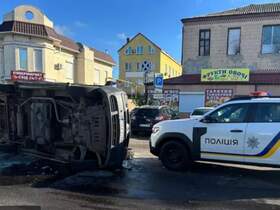Why are military personnel being beaten with impunity at the "Seventh Kilometer" market, which still belongs to Yanukovych’s entourage

Why are military personnel being beaten with impunity at the "Seventh Kilometer" market, which still belongs to Yanukovych’s entourage
On October 30, 2025, an incident occurred near the Odesa market «Seventh Kilometer» that once again raised obvious questions to which no one provides answers – during a raid by TRC workers, a crowd surrounded the military, overturned a minibus, and beat several soldiers.
The video quickly spread across the internet, accompanied by shouts of «shame» and calls to «drive out the military commissars». The police opened a case, but within a few days, the informational wave subsided. Neither the organizers nor the masterminds were identified. As in previous instances – attacks on military personnel at the «Seventh Kilometer» market have become a regular occurrence.
Official sources called it an «emotional reaction of people», but those who have studied the history of «Seventh Kilometer» for years saw a familiar scenario in the event — an organized provocation. The attackers acted too cohesively, the videos that could have exposed the faces of the «coordinators» were removed too quickly, and the financial interests behind the market, which has been controlled for decades by people from Yanukovych’s circle, are far too powerful.
Ivanyushchenko, Avramov, Halanternik — the shadow trio and closed criminal cases
«Seventh Kilometer» is not just a market. It is a financial monster with a daily turnover of millions of dollars. The ownership structure of the market is highly convoluted, with official nominees regularly changing, but journalistic investigations consistently point to entirely different beneficiaries — Yuriy Ivanyushchenko (Yura Yenakiyivsky), Ivan Avramov, and Volodymyr Halanternik.
After the Revolution of Dignity, Ivanyushchenko was accused of embezzling state funds and seizing shares in large enterprises, including LLC «Promrynok» — the then-owner of «Seventh Kilometer». Between 2014 and 2016, journalists published documents showing that the market transferred 23.5 million hryvnias to accounts in the so-called «LNR» through the so-called Luhansk Coal Enrichment Company. The financial documents were signed by the then-director of the market, Vasyl Mozgalsky — a person who still remains within the company’s structure today.
At that time, after the publication on the website «Censor.Net», the market owners filed a lawsuit — and the Darnytskyi District Court of Kyiv deemed the information «unreliable». However, the court did not refute the words of one of the market’s co-owners, Denys Voloshyn, who directly stated: money was transferred to the «LPR», and it was done by Ivanyushchenko through his people. This fact was not officially denied. On the contrary — after the scandal, the company «Promrynok» began to be reorganized «through merger» into a new legal entity — PJSC «Seventh Kilometer», to «erase» old financial traces.
However, after some time, the «reorganization» was halted – there was no longer a need for it, as it became clear that no one would investigate anything. Nevertheless, during SSU investigations at the time, the name of the offshore company Parroks Corporation Limited surfaced, reportedly belonging to Ivanyushchenko’s son, Arsen. It was to this offshore entity that 25% of the market was transferred. The remaining shares belonged to Borys Melnychuk (another 25%) — also a figure in publications about financing militants.
Among the owners, another name appears – Ivan Avramov, a business partner of Ivanyushchenko. In 2016, he received a notice of suspicion from the Prosecutor General’s Office in a case concerning the illegal seizure of shares in «Promrynok». His name appears in almost every article about the shadow assets of former «regionals».
Although he was not held accountable for financing terrorism, investigative sources describe Avramov as a «shadow manager» of Yanukovych’s asset network — he was responsible for preserving and redistributing property after the former president’s escape.
In 2016, the Prosecutor General’s Office issued notices of suspicion to Yuriy Ivanyushchenko and Ivan Avramov under Part 5 of Article 191 of the Criminal Code of Ukraine — for seizing shares in the authorized capital of LLC «Promrynok» and causing damages to former owners. However, in May 2019, the Odesa Regional Prosecutor’s Office closed the case without publicly explaining the reasons.
In 2021, after a series of corporate manipulations, Volodymyr Halanternik — an Odesa developer and informal partner of Mayor Trukhanov — declared himself the owner of half of «Seventh Kilometer».
Today, Halanternik is a suspect in a criminal case by NABU and SAPO: he is accused of embezzling Odesa community property worth 689 million hryvnias and money laundering. According to journalists, it is Halanternik who controls most of the market’s financial flows — and he does not hide that he «has partners» whose names he does not disclose.
In 2021, the High Anti-Corruption Court allowed a special pre-trial investigation into Halanternik — he is suspected of embezzling Odesa community property worth 689 million hryvnias, laundering income, and participating in a criminal organization alongside Mayor Hennadiy Trukhanov (case No. 52021000000000141). However, the case never reached the court, as realists had predicted from the moment it was opened.
Currently, the official beneficiaries of «Seventh Kilometer» are listed as Kristina Mikaillidou (Cyprus) and Willem Schalk Van Geerden (South Africa) — obvious nominees behind whom the same old owners hide.
Note that the director has not changed – the market is still managed by the same Mozhalskyi, who signed the documents for transferring 23.5 million hryvnias to accounts in the «LPR».
Money flows to Russia
Journalists have repeatedly proven that the market’s financial flows have a distinct «eastern» direction. After 2014, some tenant companies continued to pay «taxes» to militants in Luhansk and Donetsk, as documented in financial records «leaked» from unfinished prosecutorial investigations.
Despite this, no real confiscation of assets has taken place. In 2019, the Odesa Regional Prosecutor’s Office closed the case against Ivanyushchenko — without explanation. Meanwhile, as reported by Sud.ua, one of the former co-owners of the market, Borys Melnychuk, was found dead in September 2023. His death served as yet another reminder: the market is not just a trading space but a nerve center of old criminal connections. Melnychuk was featured in journalistic materials about financing militants and the transfer of market shares under Ivanyushchenko’s control.
A few months earlier, rumors emerged in Odesa about attempts to redistribute ownership. Sources in law enforcement unofficially stated that after Melnychuk’s death, there were attempts to transfer the share to companies linked to Russian capital. This only reinforced the theory that «Seventh Kilometer» is one of the channels for cash flows that may serve as gray financing for Russian structures.
Why does the state remain silent?
An obvious question arises: if the state was able to purge Russian agents from the Lavra, why does it not touch a market that has been featured for years in cases related to terrorism financing?
The answer is simple — money. «Seventh Kilometer» feeds too many people. It is one of the largest sources of shadow cash in the country. After 2014, these flows were not cut off, only masked. And today, the market’s profits still go to where the political and criminal backbone of the Yanukovych era was once formed — to Moscow, Rostov, Cyprus, and Dubai.
Financial intelligence experts suggest that through a network of offshore entities, the market may be part of a hybrid economic operation by Russia — using old Ukrainian assets to replenish «black» funds. The fact that traces of individuals linked to Russian crime and special services remain in the ownership structure only strengthens these suspicions.
Beating of military personnel — a symptom, not an incident
If we look at the history of «Seventh Kilometer» more broadly, it becomes clear: the attack on the military is not a burst of emotions but a signal from the old system. It is still alive, still has resources, and can dictate the rules even during wartime. When public anger and fear of mobilization overlap with the financial interests of former «regionals» and their Moscow handlers, the result is organized provocations. And the market becomes a convenient stage for such performances.
Society, witnessing what is often done with the tacit permission of higher authorities by not entirely adequate TRC representatives, the way mobilization is conducted, and who exactly is being mobilized into the army, not only tolerates resistance to mobilization policy but increasingly welcomes such actions. This, of course, is exploited by pro-Russian forces in Ukraine.
In the situation with the beating of military personnel at the «Seventh Kilometer» market, if we set aside the emotional aspect, the dry conclusion is that we have an outright attack on Ukrainian Armed Forces soldiers committed by Ukrainian citizens. No matter under what «noble» guise this is presented in the media.
The result of these actions will greatly disappoint the attackers – as always, those who beat the soldiers and destroyed equipment, having been «incited» by puppet masters, will end up in the dock. But those who did this through their hands will remain unpunished. And they will continue to further inflame civil conflict in an already exhausted country.
A market that must be returned to the state
After the fact of financing pro-Russian forces by the market’s owners became undeniable, the logical step would be to nationalize «Seventh Kilometer». Its history is an illustration of how old clans have preserved their empires under the guise of trade.
A market that once transferred money to militants now feeds businessmen suspected of collaborating with Russian structures. And while the state turns a blind eye, its soldiers are beaten at this very market.
Ukraine may win the war on the front lines but lose it internally if it does not close such «black holes» in its own economy. Because «Seventh Kilometer» is not just a market. It is the last bastion of the «Russian world» in Odesa, still living by the laws of the mafia and feeding its masters — those who fled long ago but have never truly disappeared.
Topics: Willem Schalk Van GeerdenKristina MikaillidouIvan AvramovParroks Corporation LimitedBorys MelnychukVolodymyr HalanternikLLC PromrynokLPRViktor YanukovychYuriy YenakiyevskyiYuriy IvanyushchenkoConflictOdesa7 KilometreTRC

Comments:
comments powered by DisqusЗагрузка...
Our polls
Show Poll results
Show all polls on the website
















